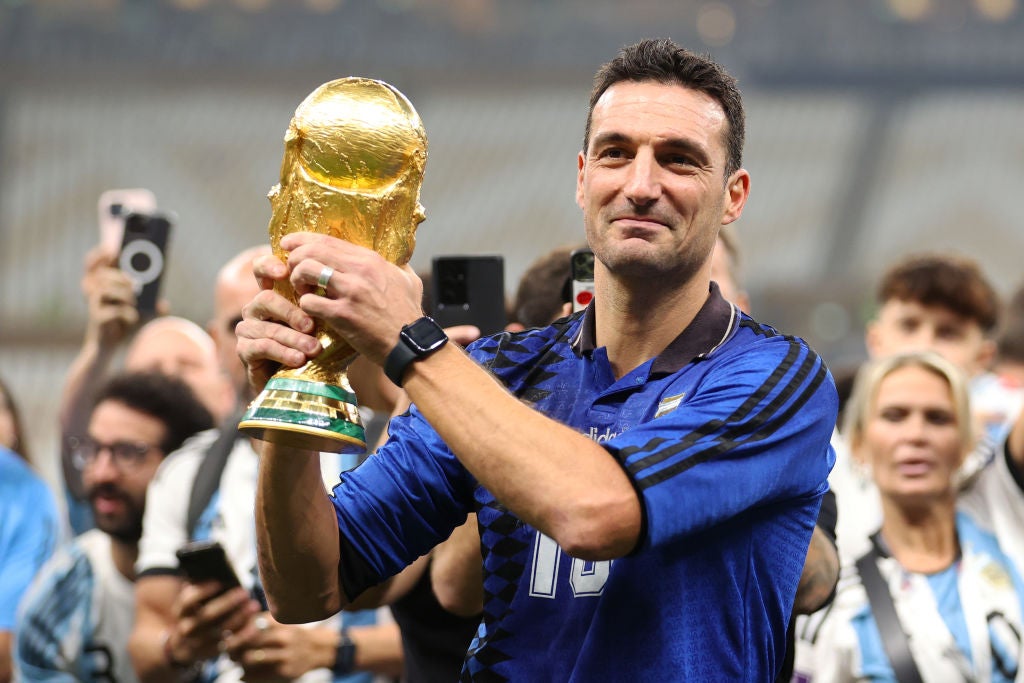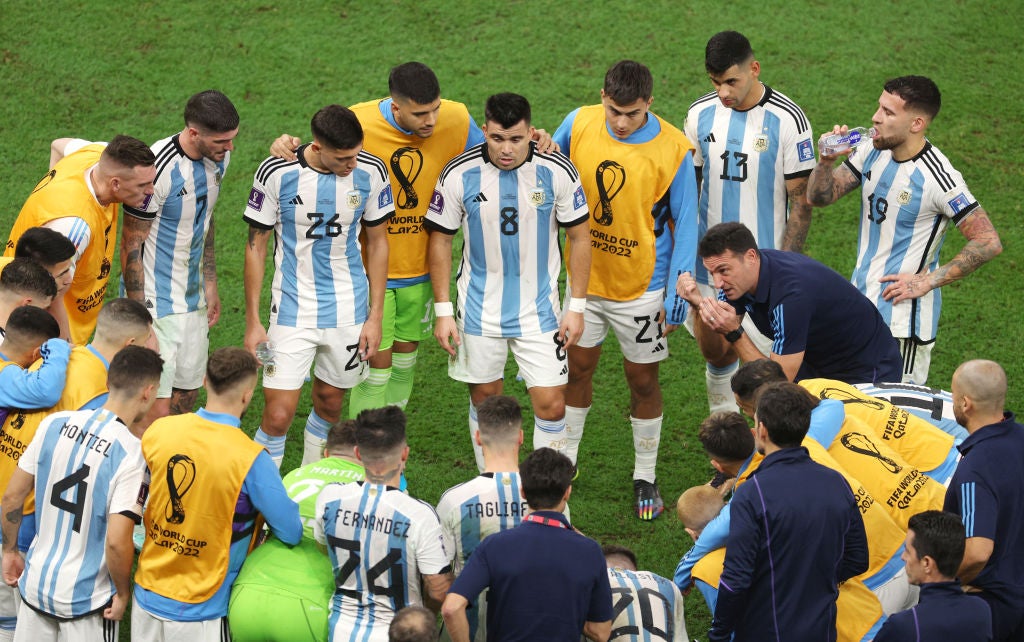
It was the World Cup of Lionel. The World Cup-winning captain who got the golden ball and the man of the match in five of his seven appearances, the player who scored in every knockout round, with a brace in the final, and the footballer who, for many, sealed his case to be deemed the greatest ever.
But also the other Lionel. The quiet man of Argentinian football, the facilitator of Lionel Messi’s dreams, the caretaker who became a World Cup winner. Lionel Scaloni is the first World Cup-winning manager who has been managed by Alan Pardew. It was probably not the secret of his success but, after securing Argentina’s first Copa America in 28 years, he now has their first World Cup for 36. He stands alongside Cesar Luis Menotti and Carlos Bilardo, though a modest figure argued: “I am not at their level yet.” Perhaps it is because it will take time for him to get used to the idea of Scaloni being a World Cup winner.
This is not to suggest he is an imposter who fluked his way to glory. A remarkable, ridiculous final could lend itself to many conclusions, and certainly Didier Deschamps altered the game with his substitutions – but for a brilliant save from Emiliano Martinez to deny Randal Kolo Muani, it would not have got to penalties. Yet Deschamps readily admitted Argentina were the better team for the first 70 minutes. Certainly, the Albiceleste appeared more fired up. Maybe Scaloni outwitted the previous World Cup winner. His side found Messi in space time and again. Their other trump card was the veteran few expected to play.

Game by game, Scaloni has proved he can alter tactics to suit a particular fixture. The 11th man in his line-up varies according to the opposition. It was a third centre-back against the Netherlands, in Lisandro Martinez; a fourth central midfielder against Croatia and Luka Modric, in Leandro Paredes. Come the World Cup final, the last name on the teamsheet was Angel Di Maria. Impeded by injury, the 34-year-old had not started since the group stages. Because of injury, he had missed the 2014 final. Told he was playing an hour-and-a-half before kick-off, finally granted an appearance on this stage, the scorer of last year’s Copa America decider won a penalty and finished a glorious team goal. With 79 minutes gone, choosing Di Maria looked like Scaloni’s masterstroke. After Kylian Mbappe’s spectacular intervention, Di Maria was demoted to the rank of a subplot.
But he was a sign Scaloni possesses a sure touch. He had promoted Julian Alvarez and Enzo Fernandez, neither of whom started the tournament in the team. The forward finished with four goals, the midfielder with the award as the tournament’s best young player. His side’s performance in the final was terrific, even if it took penalties to see off France.
The broader picture offers further evidence of his impact. Argentina have lost just once in 43 games and that defeat to Saudi Arabia seems still more of a freak result now. Nevertheless, they are still a team prone to panicking when ahead. They lost two-goal leads to first the Dutch and then the French. Calm as Scaloni often appears, his players seem to want it too much. Yet that emotion was harnessed in their high-paced start.
“This squad played for the Argentina flag,” Scaloni said. “Everyone is pulling for the whole country. This is the greatest pride.” But nationalistic calls to Argentinian pride had failed before; Diego Maradona and Jorge Sampaoli lacked the strategic sense and sound judgment to accompany their rallying cries. Scaloni’s side conceded three times in the final but had a better balance than many of their predecessors.

Perhaps, too, they have less talent than some of the other sides Messi has graced, certainly in attacking areas. The sight of Sergio Aguero lifting the trophy was a reminder that, with the notable exceptions of Nicolas Otamendi and Di Maria, Messi is not of the same generation as his teammates. Aguero is his best friend and was long his roommate. A heart complaint meant he had to retire, and did so unfulfilled in international football; but for his misses in the 2014 final, Messi’s eventual triumph might not have felt such an epic affair.
For Aguero and Gonzalo Higuain, Carlos Tevez and Javier Mascherano, World Cups ended without the crowning glory. There is a case for arguing Argentina had a stronger pool of players in 2006, with the class of Juan Roman Riquelme, Pablo Aimar and Hernan Crespo, and the combativity of Roberto Ayala, Juan Pablo Sorin and Gabriel Heinze. There were high hopes for that team’s most youthful talent, younger even than Tevez and Mascherano, one Lionel Messi. Another Lionel was a more contentious selection, with Scaloni somehow preferred to the great Javier Zanetti. His seventh cap came in Germany. It was also his last.
Sixteen years on, teammate has become manager. Scaloni’s first taste of being in charge in the World Cup brought defeat to Saudi Arabia. His most recent has produced victory in the final. “I have the best feelings ever,” said Argentina’s understated immortal.







